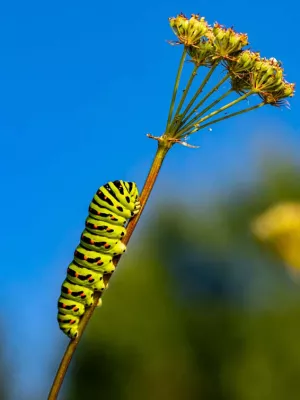From understanding how neural circuits enable perception, to how novel infectious diseases emerge, Arctic plant ecology and more — the study of biology opens up a multitude of exciting and meaningful career paths.
As a Biology student at UTM, you'll join a community of dynamic and award-winning educators, researchers and students who are continually re-imagining our understanding of plant and animal life forms.
On this page:
- What makes Biology at UTM distinctive?
- Biology, global: the worldwide impact of this discipline
- Skills you'll develop
- Career opportunities

What makes Biology at UTM distinctive?
Globally-recognized, award-winning research.
- Professor Emeritus Josef Svoboda was appointed Officer of the Order of Canada for his pioneering research on tundra ecosystems and for his lifelong mentorship of scientists studying the Arctic.
- Bridget Kathleen Murphy, PhD student, Ensminger Lab won the The Canadian Society of Plant Biologists CSPB/SCBV award for outstanding oral presentation at the 2021 CSPB/SCBV Annual General Meeting. Bridget's work focuses on the impact of climate change, specifically warming and drought, on the timing of cold acclimation in different white spruce genotypes.
A lush campus and strong sense of community.
- In addition to the program and department, as a Biology student at UTM, you'll be immersed in a truly extraordinary campus experience.
- You'll be participating in labs and research opportunities, led by the world-class educators, scientists and researchers that you'd expect from Canada's largest and most acclaimed university.
- At the same time, you'll also enjoy the down-to-earth sense of community that a campus – situated on 225 acres of lush, protected greenbelt – can provide.
- This lush natural setting is coupled with modern architecture, award-winning buildings and state-of-the art technology — providing students with a distinctive learning experience.
- Our students also benefit from the safety and inclusiveness of a tight knit campus which offers a wide variety of student groups, clubs, and activities for all interests.
Biology, global: the worldwide impact of this discipline
As noted in McKinsey Global Institute's recent research: "Advances in biological science could transform economies and societies, helping to tackle global challenges from climate change to pandemics."
From tackling overpopulation to developing life-saving vaccine trials and engineering carbon-reduced biofuels for the aviation and marine industries — biology is a discipline with far-reaching global impact.
Skills you'll develop
- Communication and interpersonal: write scientific reports; present research findings; interact professionally with a multidisciplinary team of researchers, technicians, students and professors; and literacy writing.
- Research: collect and preserve field organisms; dissect preserved or euthanized specimen; inspect specimens; and analyze and evaluate information.
- Technical: use specialized computer programs; perform laboratory procedures; maintain laboratory equipment and instrumentation; and comply with quality control procedures.
- Quantitative: analyze data for trends and apply statistical tests to data.
- Critical thinking and problem-solving: analyze and logically interpret trends and results.
Career opportunities
A background in Biology can propel you into a range of fulfilling career paths, particularly in medicine.
Other career paths include pharmaceuticals, biotechnology, forensics and more. While not exhaustive, here's a list of career options that are available to you as a Biology graduate (some require further education and experience):
Biotechnology
- Quality Assurance Auditor
- Pharmaceutical Financial Analyst
- Product Marketing Manager
- Health Care Administrator
- Business Development Research Analyst
Bioinformatics
- Operations Research Analyst
- Bioinformatics Programmer
- Bioinformatics Specialist
- Logistics Specialist
- Computer Scientist
- Web Developer
- Business Systems Analyst
Comparative Physiology
- Physiotherapist
- Ornithologist
- Exercise Physiologist
- Diagnostic Medical Sonographer
- Recreation Director
- Audiologist
Molecular Biology
- Cytotechnologist
- Bacteriologist
- Forensic Laboratory Analyst
- Microbiologist
- Medical Geneticist
Ecology & Evolution
- Environmental Health Officer
- Conservation Biologist
- Restoration Biologist
- Conservation Officer
- Agronomist*
Other
- Toxicologist
- Pharmacologist
- Marine Biologist
- Food Scientist
- Environmental Lawyer
For a full list of career opportunities, visit the Careers by Major - Biology page.
